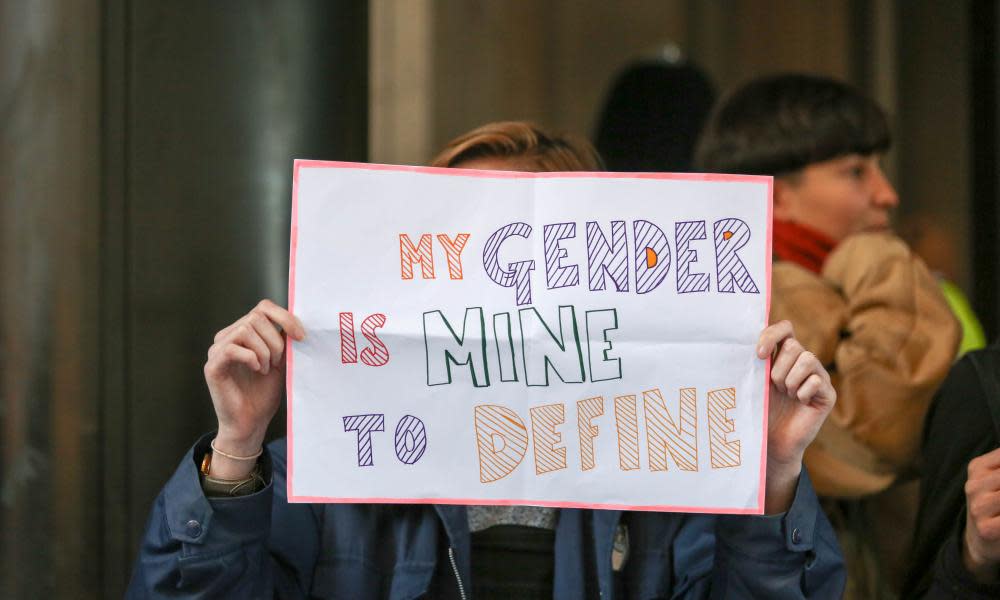Reforming the Gender Recognition Act would change my life

You may notice this is written anonymously. I’ve chosen not to put my name to this because I know that if I did, I’d be targeted by those who do not support my right to be myself. Over recent months, there’s been an increasingly abusive discussion about people such as me – people who are trans. We are at the centre of a debate that is taking place around us – questioning whether I really know who I am, or whether others know better; whether I really know my own mind; whether I am really a woman – which I am – and whether I can be trusted around other women.
The way that trans men and non-binary people have been treated in this debate has been awful too. Non-binary people – those whose gender is something other than simply male or female – have had their identities publicly mocked by commentators indistinguishable from schoolyard bullies. Friends of mine who are trans men have had their voices shouted down by those intent on “rescuing” them from being transgender, rather than respecting their experiences and autonomy.
Since the government launched its consultation on reform of the Gender Recognition Act in July, misinformation and fear-mongering have been widespread and a lot of people have been at the receiving end of abuse and hatred. Much of this has played out in the media. Instead of focusing on what the Gender Recognition Act actually is and how and why it affects trans people, the media has entertained “debates” on a huge variety of issues separate to the act, most of which are already settled in law.
So for clarity, here’s why – as a trans person – I want to see the Gender Recognition Act reformed.
As things stand today, without any reform to the Gender Recognition Act, I can use public toilets that match my gender. I can use the changing rooms that match my gender. If I find myself needing the support of domestic violence services, many women’s refuges would accept me, as they would any other woman. For trans women who “pass”, this would all happen without an eyebrow being raised. For women who may not, there might be questions in these spaces. But in any case, any trans woman or trans man can already access single-sex spaces that match their gender under the Equality Act, and have been doing so since 2004. There are exemptions, but the bar is high. Changing the Gender Recognition Act will not alter this.
However, in order to be legally recognised for who I am, I have to navigate demeaning and time-consuming bureaucracy. I must submit a portfolio of evidence – to a group of people who don’t know me and whom I will never meet – that I’ve lived in my true gender for the past two years. I have to get medical reports including two diagnoses of gender dysphoria. If I was married, I’d have to ask my spouse for their permission to be myself.
When I’ve gone through this exhausting process, the evidence is sent to a gender recognition panel. And I have to pay £140 to hear whether people I’ll never meet decide if I’m a woman.
The medical requirements are especially awful. In practice we are still required to have a psychiatrist or a psychologist confirm that we have a psychological condition that causes us to be trans. Given the waiting lists for gender identity services across the UK, this commonly takes a few years.
It’s unsurprising that so few of us go through this.
I have no plans to, and neither do a lot of my trans friends. Some of us are non-binary and would want to be recognised as a third option other than male or female – something that’s possible in about a dozen countries across the world, but not in the UK. Some of us have made the personal choice not to undergo medical treatment, and others can’t.
All this needs to change. What I’m hoping will happen is that the government will do away with the requirements I’ve mentioned. I’d like them to introduce a system of self-determination. Some other countries have already done this – one of those being Ireland. In Ireland you go to the government, sign a form in front of a government official to say you want to change your gender and that’s it. By having this form I can change my birth certificate, and having the correct birth certificate would mean the world to me.
I know it probably feels like you’ve heard loads about the Gender Recognition Act and the possible changes. But really you haven’t. You’ve heard about toilets, changing rooms, prisons, domestic violence centres, how trans children are treated, how children are educated about trans identities and a host of other things. The reality is that the act is about administration. Maybe that’s too boring to write about.
Monday at midday is the new deadline to fill in the consultation into reform of the act. It was so oversubscribed that the government had to extend it.
Please take the time to fill it in, remembering that you’re doing it so that ultimately I can get the right birth certificate. I deserve to be proud of my gender and I deserve to be treated with dignity. After this past few months, dignity for trans people is more important than ever.

 Yahoo News
Yahoo News 
